When Joe Bob Briggs was recently asked to pick a director whose career intrigued or frustrated him the most, he barely hesitated before naming Frank Henenlotter, the exploitation pioneer who made just 6 feature films in 25 years and 3 of them were for his own Basket Case franchise. If Briggs had his way, Henenlotter wouldn't have been so damn precious with his ideals and actually taken one or two of the many jobs which were offered to him over the years but got turned down because he wanted more money or didn't like the script. Such refusal to ever compromise makes it hard on all those Henenlotter fans who would have been more than happy to see him at least make something new, Briggs argued.
That's how I feel about Quentin Tarantino, particularly as I sit down to rank his filmography. How is it that we're nearly 30 years into his historic career and he's only directed 9 movies ( Reservoir Dogs, Pulp Fiction, Jackie Brown, Kill Bill, Death Proof, Inglourious Basterds, Django Unchained, Hateful Eight, Once Upon a Time...in Hollywood; 10 if you count Kill Bill as two movies) and written three others ( True Romance, Natural Born Killers, From Dusk Till Dawn) which he did not direct?

How come he never made that Pulp/ Reservoir prequel about the Vega brothers? What would his Man from U.N.C.L.E. have looked like? How many more years can we bear of him talking about a Kill Bill: Vol 3 or R-Rated Star Trek movie before something tangible finally comes of it?
Indeed, much like the alt-history universe of some of the director's recent historical epics like Inglourious Basterds there's an alt-history of the past 30 years in which Tarantino was far more productive, followed through on more of his ideas, and thus reached 2019 with fewer unfinished scripts left in the desk drawer. However, in his own estimation if Tarantino made more movies then he wouldn't seem so special anymore. Few filmmakers - Kubrick comes to mind - have ever been so either driven to perfection or deliberate about limiting their own supply in order to increase demand. Now with Tarantino talking about retiring after his tenth film, we are stuck with a frustratingly small body of work but also one which has almost never dipped in quality.
So, how do I rank his movies when I actually quite like just about every single one of them? Easy: I start with the one I don't like at all.
13. Natural Born Killers
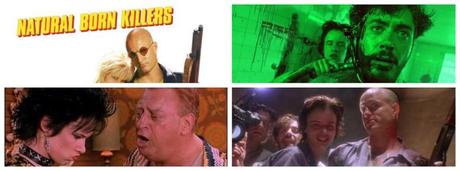
What It's About: A dark cousin to True Romance, Natural Born Killers is Oliver Stone's aggressively unsubtle depiction of two lovers - Mickey and Mallory (Woody Harrleston and Juliette Lewis) - who go on a killing spree and become media sensations in the process.
Backstory: Natural Born Killers actually began its life inside of True Romance. The plight of Mickey and Mallory and the tabloid journalist following them was part of a screenplay Clarence (Christian Slater) was to have been writing while traveling the country with his hooker-turned-girlfriend Alabama (Patricia Arquette). Mickey and Mallory's exploits would have been depicted as a movie-within-a-movie, and on top of that they weren't even the main characters of this little mini-movie - the tabloid journalist (ultimately played by Robert Downey, Jr.) was.
By the time Tarantino finished it all, his True Romance script came in at a whopping 500 pages, big enough to make him realize all of the stuff with Mickey and Mallory really needed to be its own movie. After separating the two scripts, he sold Natural Born Killers to two young producers who then sold it to WB who then gave it to Oliver Stone.
Naturally, the Platoon filmmaker commenced with a heavy rewrite, turning it into more of a heavy-handed satire and very early 90s commentary on the media's culpability in sensationalizing crime. He also elevated Mickey and Mallory to be the obvious stars of the show, showcasing them so much that the remarkably jarring visual design of the entire film - stark color filters, 45 degrees angles - was picked to emphasize their madness.
In the end, Tarantino, who briefly tried to buy back the script and make the movie himself, received just a story credit.
Quentin's Take: "I wish Stone had just fucking ripped it off. His biggest problem is that his obviousness cancels out his energy and his energy pumps up his obviousness. He's Stanley Kramer with style." Elsewhere, Tarantino was a tad more diplomatic, "If you like my stuff, you might not like this movie. But if you like Oliver's stuff, you're probably going to love it."
My Take: Well, I don't generally like Oliver's stuff. As a result, I don't love Natural Born Killers. I have to agree with Quentin's first assessment, which is that Natural Born Killers is ruined by a director who just can't get out of his own way. He's shouting at us with a bullhorn the entire time when a simple microphone would have been enough. Perhaps that owes to the immediacy of it all for Stone, seeing as he was responding directly to the OJ Simpson trial and other early 90s crime scandals before they'd even completely resolved and general trends in the media before they'd had a chance to play out. Or maybe that's just Oliver Stone being Oliver Stone.
The one good thing to come out of this is cinematographer Robert Richardson, who had worked with Stone for years but eventually jumped ship to man the camera for Scorsese (starting with Casino) and Tarantino (starting with Kill Bill). Under his watchful eye, Tarantino's films have never looked better.
Favorite Scene: None
12. Death Proof
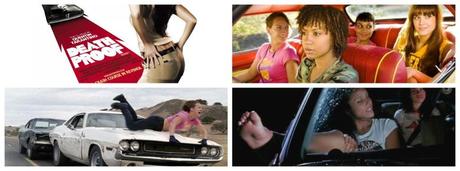
What It's About: A slasher movie where the killer uses a car instead of a knife. To be more specific, a former Hollywood stuntman hunts down women using his death-proofed stunt car but eventually sets his sights on a couple of gals who are more than capable of taking the fight right back to him.
Backstory: While admiring a vintage poster together for a 1957 double bill of Dragstrip Girl and Rock All Night, Robert Rodriguez turned to pal Tarantino and said, "We should do a double feature! I'll do one, and you do one."
It all moved pretty fast after that. Rodriguez came up with an over-the-top script about an exotic dancer who loses her leg to flesh-eating bacteria and then replaces it with a machine-gun prosthetic. He called it Planet Terror.
Tarantino decided to make something comparatively more grounded, hatching a rather simple slasher about a stuntman killing promiscuous girls for no grand reason. It was a continuation of his long-standing fascination with the way stunt people can actually "death-proof" their cars to be able to survive high-speed collisions. Moreover, like the B-movies of old he limited himself to just two big setpieces because that's all those old movies would have been able to afford.
Planet Terror and Death Proof, along with some fake trailers, came together as a double bill called Grindhouse, but Rodriguez and Tarantino's exploitation homage arrived probably a decade too early. While the exploitation genre has undergone a re-appreciation period over the past couple of years, the people of 2007 just didn't get it, and as a result Grindhouse bombed.
Quentin's Take: "I realized that if I did my own slasher film, it'd just be too self-reflective. So I decided that I should do it the way I did Reservoir Dogs, which was my weird version of a heist film. So this is my weird version of a slasher film."
My Take: I sometimes struggle with movies which are made to slavishly recreate the way a certain kind of film used to look. Why do I need to see an imitation of a B-movie slasher which adds nothing new when the real thing already exists? Why am I supposed to swoon with nostalgic delight when Death Proof occasionally appears to be shot on grainy film with cigarette burns? How am I supposed to take it when there's an occasional "Reel Missing" title screen when in fact I know there's no missing reel? In a genuine old drive-in movie, they would indeed occasionally have missing reels; here it's included as an affected reminder of failure.
If you're in for that kind of nostalgia, have at it. If not, it feels a bit like watching someone's tribute video to a band you vaguely know but don't totally love. Rodriguez and Tarantino had probably already made a better grindhouse homage with From Dusk Till Dawn.
But the longer you stick with Death Proof the more you appreciate the twists Tarantino is bringing to the table. The entire ensemble cast is killed and replaced halfway through. A head-on car collision scene we expect to be avoided at the last second instead revs forward with astonishing carnage. Kurt Russell's badass stunt driver turns out to be a kind of early version of a sad, pathetic incel. And the whole thing culminates with one of the best, most insane car chase scenes you could ever hope to see.
The only reason I rank it this low is because for all of Death Proof's cleverness it still feels like the least substantial of all Tarantino movies - a romp, a clever experiment, but still the rather lite bit of fun he made to put off finally finishing his Inglourious Basterds script. However, there's more to admire about it than you might think.
Favorite Scene:All hail, Zoe Bell.
11. The Hateful Eight
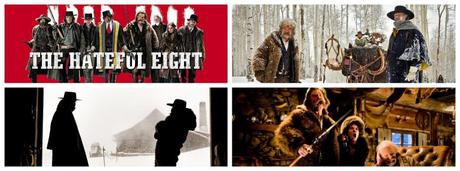
What It's About: Reservoir Dogs in the Old West, an Agatha Christie Poirot mystery without an actual mystery, The Thing as a western - however you want to describe it, Hateful Eight is a post-Civil War story about a group of rather heinous people stuck in a cabin together during a blizzard. At least one of them is not who they say are, and it's up to Samuel L. Jackson's Major Marquis Warren to get to the bottom of it.
Backstory: After Django Unchained, Tarantino just couldn't get the western out of his system, and while looking through his collection of old TV shows he noticed something. "Twice per person, those [old western] shows [like Bonanza, The Big Valley, and The Virginian] would have an episode where a bunch of outlaws take the lead characters hostage. I thought, '"What if I did a movie starring nothing but those characters? No heroes. Just a bunch of nefarious guys in a room, all telling backstories that may or may not be true. Trap those guys together in a room with a blizzard outside, give them guns, and see what happens."
At one point, Tarantino even considered throwing Django into the mix of outlaws, thus making Hateful Eight an unofficial sequel. However, he dropped that idea quickly and then nearly dropped the entire script when it leaked online to Gawker. At the very least, he contemplated turning it into a play. However, he chose to lean into the "everyone's already the script anyway" of it all and hosted a public reading with actors like Kurt Russell, Samuel L. Jackson, Walton Goggins, Amber Tamblyn (who would eventually be replaced by Jennifer Jason Leigh), and Michael Madsen. The warm reception convinced him to return to his original plans to bring Hateful Eight to the big screen.
Adding to Quentin's renewed vigor was his decision to film in Ultra Panasion 70, a nearly extinct format popularized decades ago in epics like Ben Hur. The cherry on top of this cinematic sundae came when spaghetti western composer Ennio Morricone agreed to let them repurpose an old, unused score he had originally written for The Thing. This deeply foreboding, brooding music instantly changed the flavor of Hateful for the better and netted Morricone his first, non-honorary Oscar.
Quentin's Take: "I was in a real kind of funky area when I wrote the script. I kind of had a lot of anger in me, and so it all came out in the script. And that was good. That was a good place to put it."
My Take: By far Tarantino's nastiest and meanest movie, Hateful Eight tests the patience of anyone with a low tolerance for seeing a group of men repeatedly abuse Jennifer Jason Leigh. However, there's a bit of a Django trick going on here - we are meant to want to see her abused because she's such a monstrous, unpleasant person. So are most of the guys, though, and when she finally pounces and takes some of them down it's brutal and surprising but they had it coming. The climax - where misogyny seems to trump racism as the force capable of bringing foes together against a common enemy - is also a bit of a problem.
However, as, essentially, a filmed play with several standout performances, the whole thing lurches forward with an unmistakable confidence and delights in simply watching people on opposite sides of the social and political divide converse. When suspicions and paranoia take over, Jackson commands the screen as a black Poirot piecing the clues together. The eventual grand guignol bloodletting shows how far audiences and movie censors had come since the days of the comparatively tame Reservoir Dogs. It is too long, though, and might actually work better in its new from as a limited Netflix series with each chapter edited to become an individual episode.
Favorite Scene:It triples as a technical showcase for 70mm, a call to appreciate Morricone's brilliance, and a crazy effective mood-setter.
10. True Romance
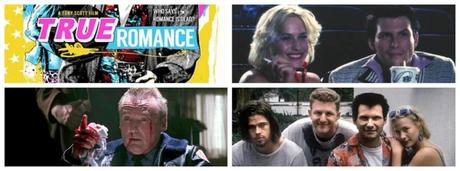
What It's About: A lonely, movie-obsessed comic book store employee (Slater) sets off on a cross-country adventure with his hooker-turned-girlfriend (Arquette). Angry mobsters are hot on their heels, and cocaine-snorting movie producers as well as rather heartless cops lay ahead of them.
Backstory: Distressed over his failed and unfinished first movie, the black and white rarity My Best Friend's Birthday, Tarantino still managed to land an agent, a guest spot on Golden Girls, and a potential career as a script doctor. One of his first big rewrites was for old buddy/former Video Archives co-worker Roger Avary, who was also trying to make it as a writer. He'd taken a stab at a yuppie nightmare cycle script about a businessman who picks up a crazy hitchhiker and ends up on a bizarre midwestern town. He called it The Open Road.
In Tarantino's hands, however, The Open Road became True Romance, a half-autobiographical, half-fantasy story about a Detroit comic book story employee thrust into a series of criminal encounters broadly resembling a Scorsese film or Godard's Breathless. Given the amount of violence and vulgar language Tarantino put it into it, none of the studios wanted anything to do with what was now very much his script. So, he went around the system.
Through happenstance, he met director Tony Scott on the set of The Last Boy Scout and they partied together. Afterward, the young writer slipped the accomplished director copies of both True Romance and Reservoir Dogs. The offer: you can direct either one, but not both. It should be fairly obvious which one Scott picked.
"For me, it was one of the fullest, most accomplished scripts that I'd ever read. The movie is such a strange mixture. It's a black comedy to me," Scott said. Of course, Scott made it more his own thing, straightening out Tarantino's jumbled timeline into something more traditional and linear, dropping the tragic ending for a happy one, and infusing the whole thing with far more actual romance.
However, after Tarantino went off and made Reservoir Dogs to wide critical acclaim Scott extended the rather generous offer to step back. He gave Quentin the chance to retake True Romance and direct it himself. At the very least, he opened the door for Tarantino to be on set everyday for any rewrites. Tarantino refused. He didn't want to direct True Romance anymore because it was always written to be his brash, attention-grabbing first movie, and he'd already done that with Reservoir Dogs. He also didn't want to be on set for rewrites because he'd already made his peace with handing it off to Scott.
Quentin's Take: "I was trying to do my version of an Elmore Leonard novel in script form, and ended up with the most autobiographical thing I had ever written."
My Take: From Slater's opening monologue about Elvis and Sonny Chiba to the Mexican standoff finale, there is so much here which is quintessential Quentin. However, with Scott's signature, filtered camera lens capturing it all True Romance looks like a California fairy tale, with glam and grit beautifully colliding, a style which has won over many fans over the years but leaves me feeling a bit on the outside. Scott's visual style has just never been my cup of tea.
Moreover, watching True Romance in 2019 for the first time does paint Alabama as a far more problematic character than she probably seemed back in the day. Despite Arquette's exquisite performance and her bookending voiceovers about romance, Alabama comes off as exactly the kind of fantasy woman a young twentysomething dude would create as both a source of sexual satisfaction and key to a new life of adventure and happiness.
That being, Slater and Arquette pop together on screen, and the scenes between Slater and Hopper as son and mostly absentee father are quite possibly the most nakedly honest sequences of any Tarantino movie.
Favorite Scene:A tie between Dennis Hopper and Christopher Walken's face-to-face and Saul Rubinek's over-the-top freakout during the Mexican standoff.
9. Django Unchained
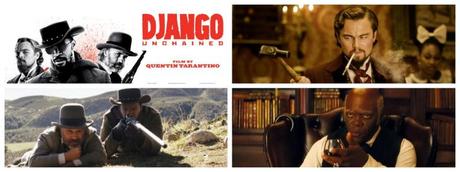
What It's About: A German bounty hunter (Christoph Waltz) in the Old West trains a new black apprentice (Jamie Foxx) and agrees to help him free his wife (Kerry Washington) from a ruthless plantation owner (Leonardo DiCaprio). Shit goes south real fast.
Backstory: "I was listening to spaghetti western soundtracks, and the first scene came to me. Dr. King Schultz just came out of my pen." What flowed from there was essentially a superhero origin story about a mythical black slave-turned-bounty hunter named Django who becomes the Luke Skywalker to Schultz's Obi-Wan. Tarantino, in fact, initially thought about getting the origin story out of the way in the first act before jumping way ahead until well after the Civil War and later in Django's life. However, it had been too long since he'd actually stuck with a linear story, which made it all the more intriguing to try that out here.
And if Tarantino had written this 10- to 15-years earlier Samuel L. Jackson would have been his Django, but the 62-year-old recognized he was too old for the part. That forced Tarantino to shop around for other candidates, flirting for a spell with Will Smith, before landing on Jamie Foxx. However, both Foxx and the entertainly hammy Waltz would be upstaged by the far more surprising turn from DiCaprio, who was terrified of playing such an unapologetic racist but eventually gave himself over to it.
Quentin's Take: "I got the chance to take a slave character and give him a heroic journey, make him heroic, make him give his payback. To show this epic journey and give it the folkloric tale that it deserves."
My Take: When Tarantino made Pulp Fiction, he defended his extensive use of the n-word as his attempt at empowerment-disempowerment - to rob the word of its power - even though he was a white guy who put himself into the movie as a character who drops the n-word to a disgusting extreme. By the time he made Django Unchained, Tarantino seemed to better appreciate the actual power of the word, and thus created a story where we are supposed to hate the people who say it and cheer when they finally get theirs.
That this then turned into the highest-grossing film of his career certainly registered as a big surprise at the time, but upon rewatch you can see why Django resonated. It truly is a rewarding, relatively straight-forward revenge fantasy, and if only it was maybe 20-30 minutes shorter it would register as one of, if not the "best" then at least most traditionally "entertaining" titles in the Tarantino canon. However, the whole thing just drags on for far too long, and when both Waltz and DiCaprio abruptly exit stage left Django's solo rise to folk hero feels almost anti-climactic.
This was the first movie Tarantino made without the aid of his editor Sally Menke, who died of heatstroke in 2010 while walking her dog, and her absence is deeply felt. Quentin needed her around to help tighten this up.
Favorite Scene:It feels like a very Tarantino version of painting the KKK as cartoonish idiots, similar to the Coen's stab at it in O Brother, Where Art Thou?.
8. From Dusk Till Dawn
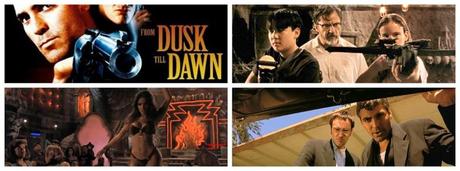
What It's About: Bankrobbing brothers (George Cooney, Tarantino) on the run from the law kidnap a family of three (Harvey Keitel, Juliette Lewis, Ernest Lui) and use their RV to cross the border. One, teensy, tiny problem: the Mexican stripclub they stop off at turns out to be a tourist trap run by vampires. Good thing B-movie badasses played by Tom Savini and Fred Williamson happen to be around to help kick ass.
Backstory: Tarantino's first professionally sold script, From Dusk Till Dawn was designed from the get-go to be a showcase piece for Hollywood effects company KNB. That company's owner, Robert Kurtzman, paid Tarantino $1,500 to write the script and in exchange they agreed to handle the effects for Reservoir Dogs' ear-cutting scene. Several years later, From Dusk Till Dawn finally became a reality, directed by Robert Rodriguez since Tarantino preferred to take a part as one of the brothers and focus more of his attention on acting.
Quentin's Take: "I just had such a good time with those characters. It's two movies put together, and you kind of flip a switch. And we don't indicate it to the audience."
My Take: From Dusk Till Dawn is a great trick movie. We are suckered into thinking we're getting one thing and then the proverbial rug is pulled out from under us. Such films are a jolt-the-system joy to experience the first time, and then maybe a rewatch is called for to pick up any possible hints of foreshadowing you might have missed. After that, though, the specialness starts to wear off, and once you know the secret to the magic trick you either move on and remember it as a bit of a novelty item or you keep coming back to it for the characters.
In that regard, From Dusk Till Dawn brings me back for Harvey Keitel's noble preacher or just to drink in Clooney's right-on-the-cusp-of-megastardom charisma. Even Tarantino's performance as a sex criminal registers as believable enough. When character gives way to incident and we spend the entire second half of the film in the middle of a bar fight with vampires, it does drag on for maybe too long, but there's plenty Evil Dead II-style over the type comedy to hold your attention.
Favorite Scene:I'm partial to Tom Savini's freakout as he gradually turns into a vampire but seems to be in denial about it, hilariously hiding his new vampire hand behind his back instead of telling everyone to run before he loses control. But, who are we kidding? This movie is and will always be remembered for Selma Hayek orchestrating one of the most seductive dances in cinematic history.
That's it for today's ranking. Come back tomorrow to learn more about Inglourious Basterds, Jackie Brown, Kill Bill 1 & 2, Once Upon a Time In Hollywood, Pulp Fiction, Reservoir Dogs and see where they fall in my ranking of all-time Tarantino. Until then, what do you think of my 8-13 picks? Let me know in the comments.Source: Tom Shone's Tarantino: A Retrospective
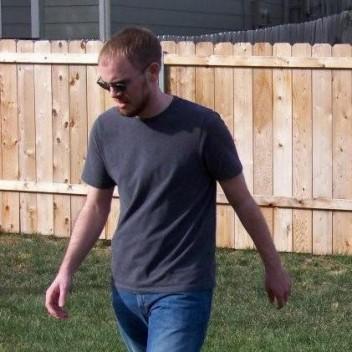
Grew up obsessing over movies and TV shows. Worked in a video store. Minored in film at college because my college didn't offer a film major. Worked in academia for a while. Have been freelance writing and running this blog since 2013. View all posts by Kelly Konda

